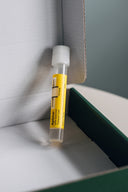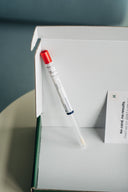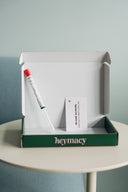- be responsible.
- Keep intimacy easy.
- Get tested.
- be responsible.
- Keep intimacy easy.
- Get tested.
- be responsible.
- Keep intimacy easy.
- Get tested.
- be responsible.
- Keep intimacy easy.
- Get tested.
1. In love
For anyone who's newly in love – or wants to have sex without a condom. Trust is sexy. But it should also be safe. Before you skip the condoms: check each other out. A small test, big clarity.
Recommended tests:
• Chlamydia
• Gonorrhea
• HIV
• possibly syphilis
Recommended timing:
• 1x before giving up condoms
• Then annually for safety


2. Active & Aware
For sexually active people with multiple partners. Meeting a lot of people means taking good care of yourself. Regular checkups are simply a part of routine – like brushing your teeth. Only less often.
Recommended tests:
• Chlamydia
• Gonorrhea
• HIV
• Syphilis
• Trichomonads
Recommended timing:
• Every 3-6 months
• Or in case of risky contact, also in between


3. On PrEP
For people taking HIV PrEP. PrEP protects against HIV—but not against everything. Regular testing is part of the PrEP routine. It's your responsibility—for yourself and others.
Recommended tests:
• Chlamydia
• Gonorrhea
• Syphilis
• HIV (control test)
• Hepatitis (B) & C
Recommended timing:
• Every 3 months
• Many HIV specialist practices require this proof


4. Something is wrong?
If you notice symptoms like itching, discharge, or burning, many STIs only show up later – others immediately. If you notice that "something is wrong," the rule is: get tested, don't wait.
Recommended tests:
• Chlamydia
• Gonorrhea
• Trichomonads
• possibly herpes or syphilis (in case of skin changes)
Recommended timing:
• As soon as possible after the onset of symptoms


5. Risky contact or partner positive?
After unprotected sex or if your partner has tested positive. If you know, act quickly—many STIs are treatable if detected early.
Recommended tests:
• HIV (after at least 2 weeks)
• Chlamydia
• Gonorrhea
• Mycoplasma genitalium
• Mycoplasma hominis
• Ureaplasma parvum
• Ureaplasma urealyticum
• Possibly syphilis, hepatitis B/C
Recommended timing:
• HIV after 14 days at the earliest (better after 4–6 weeks)
• Other STIs from 7 days


6. Before the device...
Before inserting an IUD or other hormonal contraceptive, everything should be clear before the procedure. Some infections go unnoticed – and can be dangerous with an IUD. A simple test will protect you.
Recommended tests:
• Chlamydia
• Gonorrhea
Recommended timing:
• Approximately 1–2 weeks before the procedure


7. Pregnant and Protected
For anyone who is pregnant or planning to become pregnant. What you do for yourself now also protects your child. Some STIs are asymptomatic but can endanger pregnancy or childbirth. A test provides peace of mind – early and discreetly from home.
Recommended tests:
• Chlamydia
• Gonorrhea (clap)
• Syphilis
• HIV
• possibly Mycoplasma hominis & Ureaplasma urealyticum/parvum (in case of recurrent infections or IVF)
• possibly hepatitis B & C (usually also recommended by a doctor)
Recommended timing:
• Desire to have children: Before the first attempt – for you and your partner
• Pregnancy: At the earliest in the 1st-2nd week of pregnancy, then repeat in the 2nd or 3rd trimester if necessary
• In case of symptoms or risk contact: immediately
💡 Also useful: If you have an IUD removed to get pregnant – rule out STIs beforehand.


Your advantages with heymacy
Whether you're newly in love, curious, or just unsure - we make it as comfortable and easy as possible for you.
STI testing is like a beauty routine for your sexual health.
Choose your box
When is an STI test useful?
✓ New relationship & condom waiver
✓ Changing partners / open relationship
✓ Symptoms (or just uncertainty)
✓ After unprotected sex or risky contact
✓ Partner tested positive
✓ Medical recommendation / health check
✓ PrEP use
✓ Desire to have children or IUD







